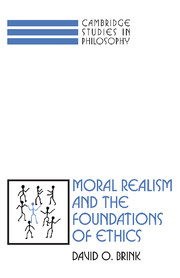Book contents
- Frontmatter
- Contents
- Preface
- 1 INTRODUCTION
- 2 MORAL REALISM AND MORAL INQUIRY
- 3 EXTERNALIST MORAL REALISM
- 4 DOES MORAL REALISM MATTER?
- 5 A COHERENTIST MORAL EPISTEMOLOGY
- 6 MORAL REALISM AND THE IS/OUGHT THESIS
- 7 A POSTERIORI OBJECTIONS TO MORAL REALISM
- 8 OBJECTIVE UTILITARIANISM
- Appendix 1 Must an infinite regress of justification be vicious?
- Appendix 2 Coherence, internalism, and externalism in epistemology
- Appendix 3 The is/ought thesis and intuitionism
- Appendix 4 Rawlsian constructivism
- Bibliography
- Index
2 - MORAL REALISM AND MORAL INQUIRY
Published online by Cambridge University Press: 11 January 2010
- Frontmatter
- Contents
- Preface
- 1 INTRODUCTION
- 2 MORAL REALISM AND MORAL INQUIRY
- 3 EXTERNALIST MORAL REALISM
- 4 DOES MORAL REALISM MATTER?
- 5 A COHERENTIST MORAL EPISTEMOLOGY
- 6 MORAL REALISM AND THE IS/OUGHT THESIS
- 7 A POSTERIORI OBJECTIONS TO MORAL REALISM
- 8 OBJECTIVE UTILITARIANISM
- Appendix 1 Must an infinite regress of justification be vicious?
- Appendix 2 Coherence, internalism, and externalism in epistemology
- Appendix 3 The is/ought thesis and intuitionism
- Appendix 4 Rawlsian constructivism
- Bibliography
- Index
Summary
I shall be defending moral realism against rival metaethical views. But before we examine the merits of moral realism and its rivals, we need to know what moral realism is and is not, what its rivals are, and whether, and if so why, it is of interest and worth defending.
WHAT IS MORAL REALISM?
Moral realism is a kind of metaphysical thesis about the nature and status of morality and moral claims. A realistic view about ethics presumably asserts the existence of moral facts and true moral propositions. But a moral relativist who thinks that moral facts are constituted by an individual's or social group's moral beliefs is able to agree with this. Moral realism, it seems, is committed to moral facts and truths that are objective in some way. But in what way?
We might employ either of two methods in characterizing moral realism. First, we might characterize it as a special case of a global realist metaphysical view. Second, we might characterize it in a way that is not topic-neutral, by contrasting it with metaethical views we already regard as antirealist or nonobjective. The interplay of these two methods, I believe, yields an interesting and important, if perhaps only partial, characterization of moral realism.
METAPHYSICAL REALISM
Metaethical views can be seen as special cases of more general metaphysical views. Thus, we might view moral realism as a special case of metaphysical realism. Realism about a discipline typically claims there are facts of a certain kind that are in some way mind independent or independent of human thought.
- Type
- Chapter
- Information
- Moral Realism and the Foundations of Ethics , pp. 14 - 36Publisher: Cambridge University PressPrint publication year: 1989
- 3
- Cited by



